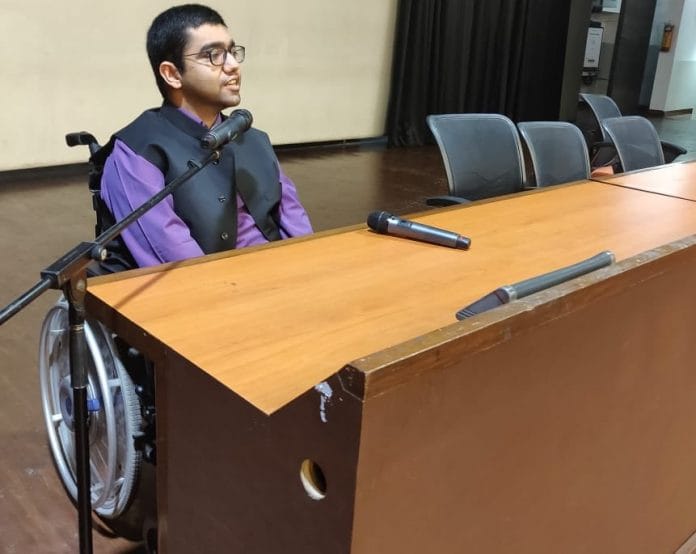Nipman Foundation has made giant strides in helping the disabled. Its marquee event, the Equal Opportunity Awards, will be held on 16 November.
New Delhi: When Nipun Malhotra drinks tea, he asks for milk, sugar, and a plastic straw.
“It’s unfortunate that most places are banning plastic straws,” he said while motioning for his cup to the waiter. “The problem with policies such as this (banning plastic straws) is that they don’t at all take into consideration people with disabilities and how it could affect us.”
Malhotra was born with arthrogryposis, a rare congenital disorder causing joint contracture that has left him wheelchair-ridden. The plastic straw, he explains, is easier to use because there is no risk of injury or wilting, as would be the case with steel and paper alternatives.
It may seem small, but people with disabilities are all too familiar with being forgotten when it comes policy, infrastructure, and just about everything under the sun.
That’s why, after having allegedly been discriminated against by hiring firms on account of his disability, Malhotra decided to launch the Nipman Foundation along with his mother, Priyanka Malhotra, a trained accessibility auditor. “Most persons with disabilities don’t have the kind of resources I was fortunate to have been born into,” he said.
The Nipman Foundation was formed in 2014, with the aim of giving those with disabilities equal access to opportunities while ensuring their dignified treatment along the way.
One of the foundation’s flagship programmes is the Nipman Foundation Equal Opportunity Awards, an annual event that recognises private sector organisations for their efforts in making jobs and products more accessible.
Since its launch, applications to the awards have increased 20 fold. The latest recipients of the award are due to be announced and felicitated on Friday, 16 November.
“In 2014, we had a total of 11 applications, and today they stand at 200”, Malhotra proudly told ThePrint. “We’re seeing a lot of companies focusing on disability and realising that there is a business case for hiring persons with disabilities and making products for them too”.
One of the winners last year was Sunrise Candles, a candle making company run majorly by visually disabled people.
“I don’t want to give away any details about winners this year, but one of the applicants was XL Cinema, which provides audio descriptions of movies for blind people,” Malhotra said. “A lot of interesting innovations are happening in this space.”
Also read: ‘With Nipman awards, we want to motivate companies to hire people with disabilities’
A string of achievements
In the short span of time it has been active, the foundation’s string of achievements has been robust: It has conducted over 50 accessibility audits around Delhi, filed several PILs pertaining to the rights of the disabled (including the removal of GST on disability aids), and is fighting to get sign language officially recognised in India.
Wheels for Life, a service run by the foundation, has managed to donate wheelchairs to victims in the Kerala floods as well as supply them to those in need as far away as in Jammu and Kashmir
“Jammu and Kashmir is often forgotten in the disability movement, it doesn’t even fall under the Disability Act (2016). We’re trying to change this through the foundation”, Malhotra said, adding, “We’ve now distributed over 1000 wheelchairs across the country to those who have needed them”.
Though the foundation is doing everything it can to eke out a space in India’s governance, it still faces one big hurdle: “No political party has a disability wing as of now. And I’d be curious to know how many parties put disability rights and issues in their manifestos”.
Without political will, Malhotra says, disability rights will always remain in the shadows. “I work both with and against the government”, he said, “And collaborating with the government on the Accessible India campaign has made me realise that though change is slow, there so many opportunities to spread awareness and educate people about the disability sector.”
“The truth is that none of us are able-bodied forever,” Malhotra said, adding that it was time we all faced up to that truth. With the awards, Malhotra is certain that the growing interest in disability rights and products could help bridge a gap that has so far been overlooked.
“Accessibility, disability aids, these are helpful to everyone, and we shouldn’t take our bodies for granted in that sense,” said Malhotra, taking a sip of tea through the plastic straw.
ThePrint is the digital partner for the Nipman Foundation Equal Opportunity Awards.






